IT CAN BE SEEN AS A GOOD NEWS FOR THAILAND’S ART AND CULTURE CIRCLE WHEN TEN REPRESENTATIVES OF THE THAI POLITICAL PARTIES CAME TO BACC TO PRESENT THEIR ART AND CULTURE POLICIES. UNFORTUNATELY, THERE WERE NO SIGHT OF THE MAIN CHARACTERS IN THIS GAME.
TEXT: PRATARN TEERATADA
PHOTO COURTESY OF BACC
(For English please scroll down)
ถ้าวันหนึ่ง “ศิลปวัฒนธรรม” กลายเป็นประเด็นหลักที่ประชาชนส่วนใหญ่ของประเทศให้ความสำคัญในลำดับต้นๆ เราคงจะได้เห็นเวทีถกทางการเมืองมีนักการเมืองระดับผู้ชิงตำแหน่งนายกรัฐมนตรีอย่าง คุณหญิงสุดารัตน์ ชัชชาติ ธนาธร อภิสิทธิ์ หรือแม้กระทั่ง “ลุงตู่” ขึ้นมาถกเรื่อง “ศิลปวัฒนธรรม” บนเวทีเดียวกัน แต่ ณ วันนี้ ความสนใจของสังคมมุ่งไปที่เศรษฐกิจและปากท้องเป็นส่วนใหญ่ ทำให้กิจกรรมการนำเสนอนโยบายศิลปวัฒนธรรมของตัวแทนพรรคการเมือง 10 พรรค ที่หอศิลปวัฒนธรรมแห่งกรุงเทพมหานครจัดขึ้นไปเมื่อวันที่ 17 กุมภาพันธ์ที่ผ่านมานี้ ไม่มีรายชื่อข้างต้นมาเลยแม้แต่คนเดียว
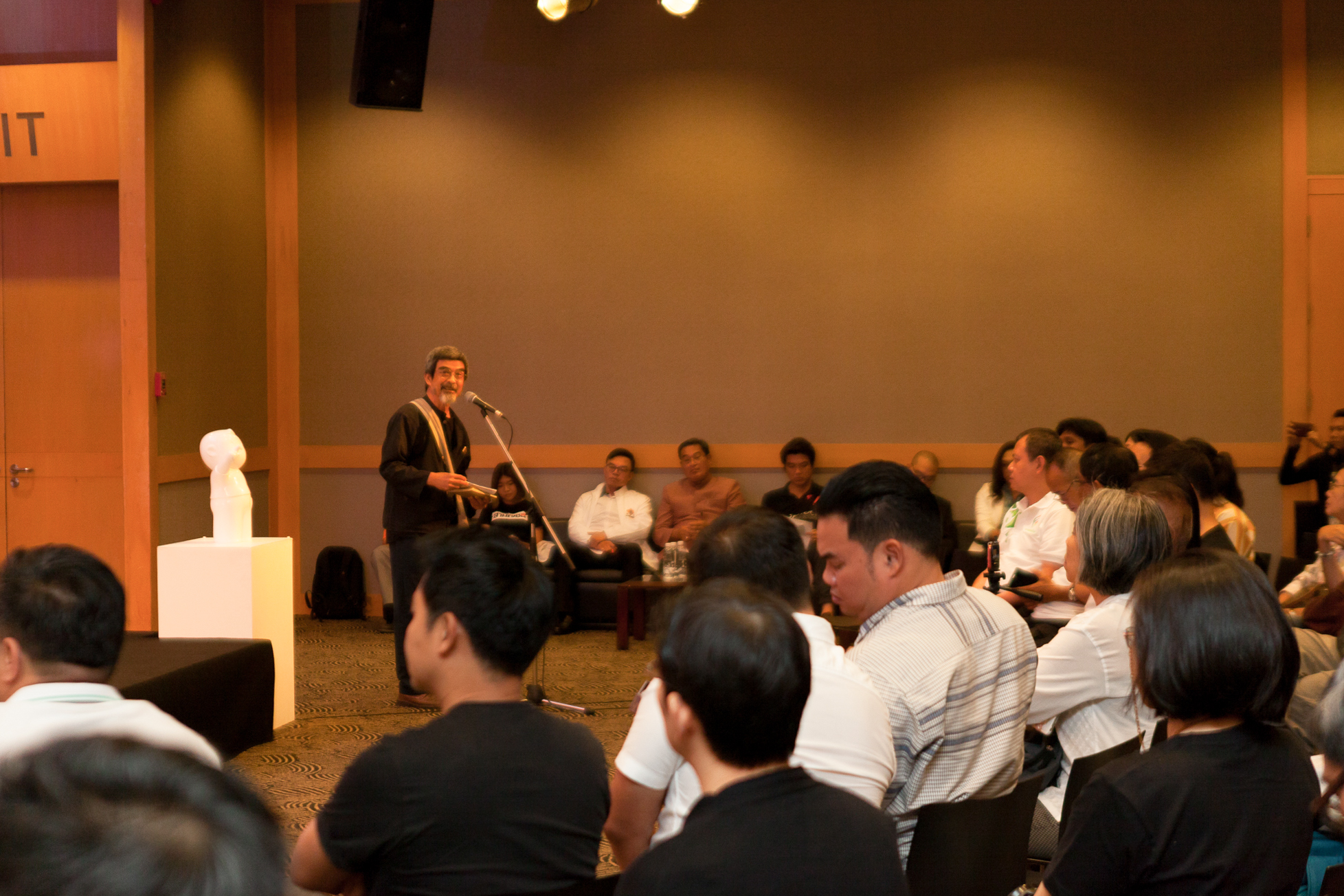
อาจารย์ปวิตร มหาสารินันทน์ ผู้อำนวยการหอศิลป์ฯ รับหน้าที่เป็นผู้ดำเนินรายการ ก่อนจะเริ่มกิจกรรมเราได้รับฟังข้อมูลอัพเดทเกี่ยวกับ BACC จาก อ.ปวิตร ว่าปัญหาเรื่องงบประมาณสนับสนุนจากกรุงเทพมหานครยังคงเป็นปัญหาอยู่ ซึ่งหากปัญหาดังกล่าวยังไม่ได้รับการคลี่คลาย หอศิลป์จะต้องยุติการดำเนินงานลงภายในเดือนตุลาคมที่จะถึงนี้ และนั่นอาจเป็นเหตุผลหนึ่งที่ทางหอศิลป์จัดงานในวันนี้ขึ้นมา ทางหนึ่งคงอยากได้ยินเสียงจากการเมืองเวทีใหญ่ว่าจะให้ความสนใจต่อหอศิลป์ซึ่งเป็นของรัฐบาลท้องถิ่นอย่างกรุงเทพมหานคร มากน้อยเพียงไร
ดร.ก้องภพ วังสุนทร หัวหน้าพรรคผึ้งหลวง พรรคที่เราเพิ่งได้ยินชื่อและรับรู้การมีอยู่เป็นครั้งแรกในงานนี้เอง ดร.ก้องภพกล่าวนโยบายของพรรคว่าเป็นการต่อยอดมาจากวิทยานิพนธ์ปริญญาเอกของตน พรรคเชื่อว่าศิลปวัฒนธรรมและทุกๆ อย่างในสังคมจะเชื่อมโยงถึงเศรษฐกิจ ทางพรรคมีแนวคิดจะตั้งธนาคารภูมิปัญญาศิลปวัฒนธรรมท้องถิ่น เพื่อต่อยอดและสร้างมูลค่าเพิ่มทางศิลปวัฒนธรรมสู่ตลาดโลก
อาจารย์ปิยบุตร แสงกนกกุล เลขาธิการพรรคอนาคตใหม่ เริ่มด้วยการโฆษณาว่าพรรคมีบุคลาการทางด้านศิลปวัฒนธรรมโดยตรง และออกแบบนโยบายมาจากสภาพปัญหาวัฒนธรรมไทยกับสากล การกำหนดให้ความเป็นไทยมีความตายตัวไม่สามารถปรับเปลี่ยนได้นั้นขัดกับความหมาย “สากล” ที่มีการลื่นไหลเปลี่ยนแปลงได้ตลอดเวลา ด้วยความเชื่อที่ว่าศิลปวัฒนธรรมเป็นเครื่องมือในการเปลี่ยนแปลงความคิดผู้คนได้ ทำให้พรรคนี้มีแนวทางที่เน้นการกระจายอำนาจทางวัฒนธรรมไปสู่ท้องถิ่น ผ่านการสร้าง community art space ทุกจังหวัดและการผลักดันให้มีสภาศิลปวัฒนธรรมแห่งประเทศไทย ปิดท้ายด้วยสโลแกน “ไทยสองเท่า” คือเท่าเทียมกันและเท่าทันโลก
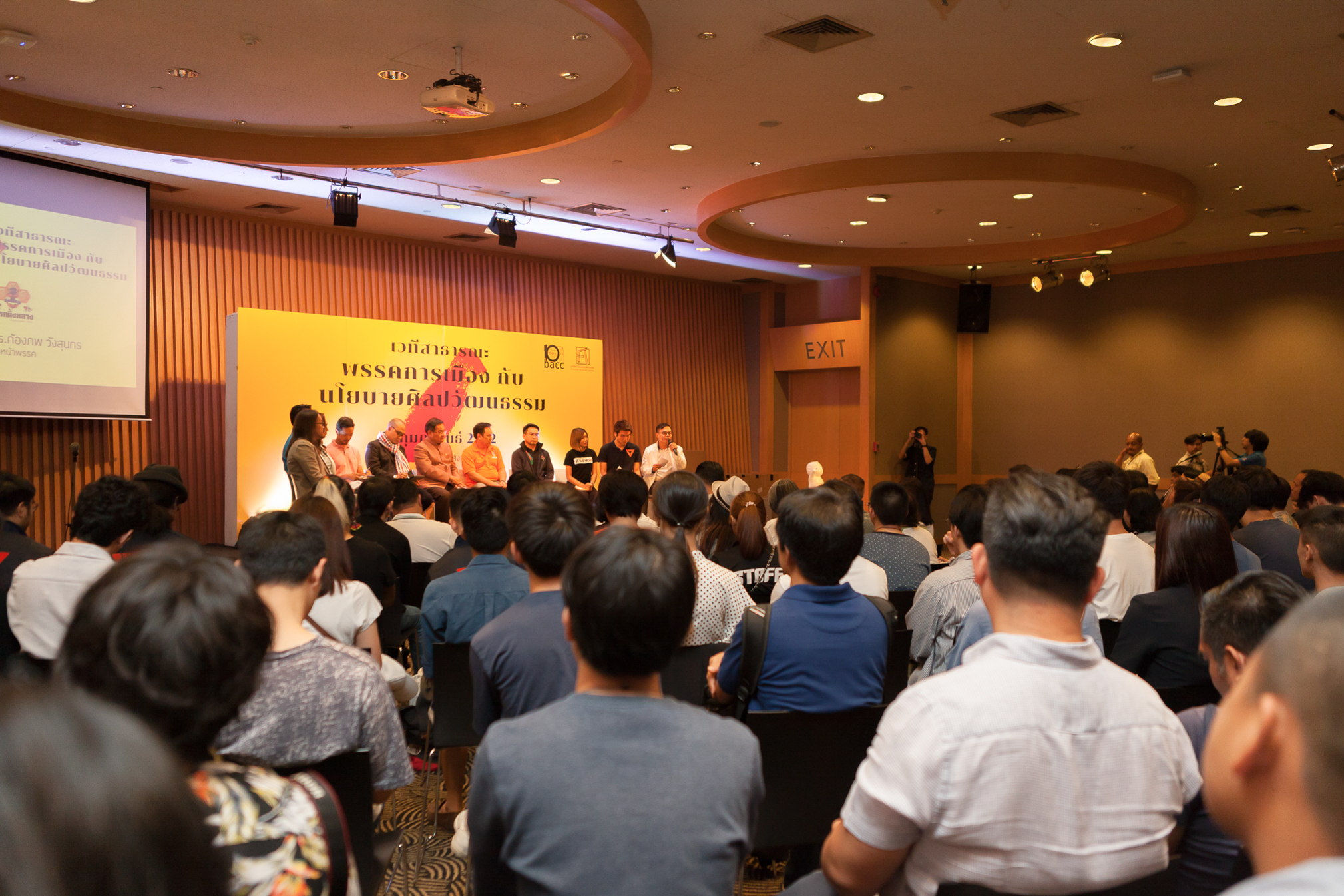
ลักษณารีย์ ดวงตาดำ คณะทำงานพรรคสามัญชน เปิดมาด้วยมุมมองทางด้านปัญหาที่ทำให้ศิลปะไม่โต เพราะเพดานทางวัฒนธรรมไทยต่ำมาก มีกฎหมายกดเอาไว้หมด ระบบการศึกษาก็ไม่สนับสนุนให้เกิดการแหกกฎเกณฑ์ ทางพรรคต้องการแก้กฎหมายที่จำกัดเสรีภาพในการแสดงออกหรือเล่าเรื่องตามความเชื่อของตัวเอง
ชื่นชอบ คงอุดม ผู้สมัครบัญชีรายชื่อพรรคพลังท้องถิ่นไทย เชื่อว่าความเจริญของไทยวัดจากความสุข ไม่ใช่รายได้ นโยบายพรรคจะสร้างศูนย์การเรียนรู้เปิด 24 ชั่วโมง สร้างมูลค่าทางวัฒนธรรม และดึงคนท้องถิ่นเข้ามามีส่วนรวม โดยยกตัวอย่าง หมีคุมะมง ของจังหวัดคุมาโมโตะ ประเทศญี่ปุ่น ที่ประสบความสำเร็จอย่างสูง
นิกร จำนง ผู้อำนวยการพรรคชาติไทยพัฒนา นำเอาประสบการณ์สมัยเป็นรัฐมนตรีมาแบ่งปัน ดูเหมือนอดีตรัฐมนตรีท่านนี้จะแสดงตัวตนว่าชอบเล่นกีตาร์และอยู่ฝั่งเดียวกับศิลปินเสมอ ส่วนนโยบายของพรรคทางด้านศิลปวัฒนธรรมจะยืนอยู่บนความเป็นไทยและการยอมรับความหลากหลายทางวัฒนธรรม
ร.ต.อ. ดร.จอมเดช ตรีเมฆ จากพรรคพลังประชาชาติไทย สนับสนุนความร่วมสมัยของไทย อยากส่งออกความเป็นไทยให้โลกสนใจ ทั้งนี้ชุดความคิดความเป็นไทยไม่ควรมาจากส่วนกลาง แต่เน้นอัตลักษณ์ของแต่ละท้องถิ่น นอกจากนี้ พรรคยังต้องการทำให้มหาวิทยาลัยศิลปากรเป็นหัวใจของศิลปินอย่างจริงจัง
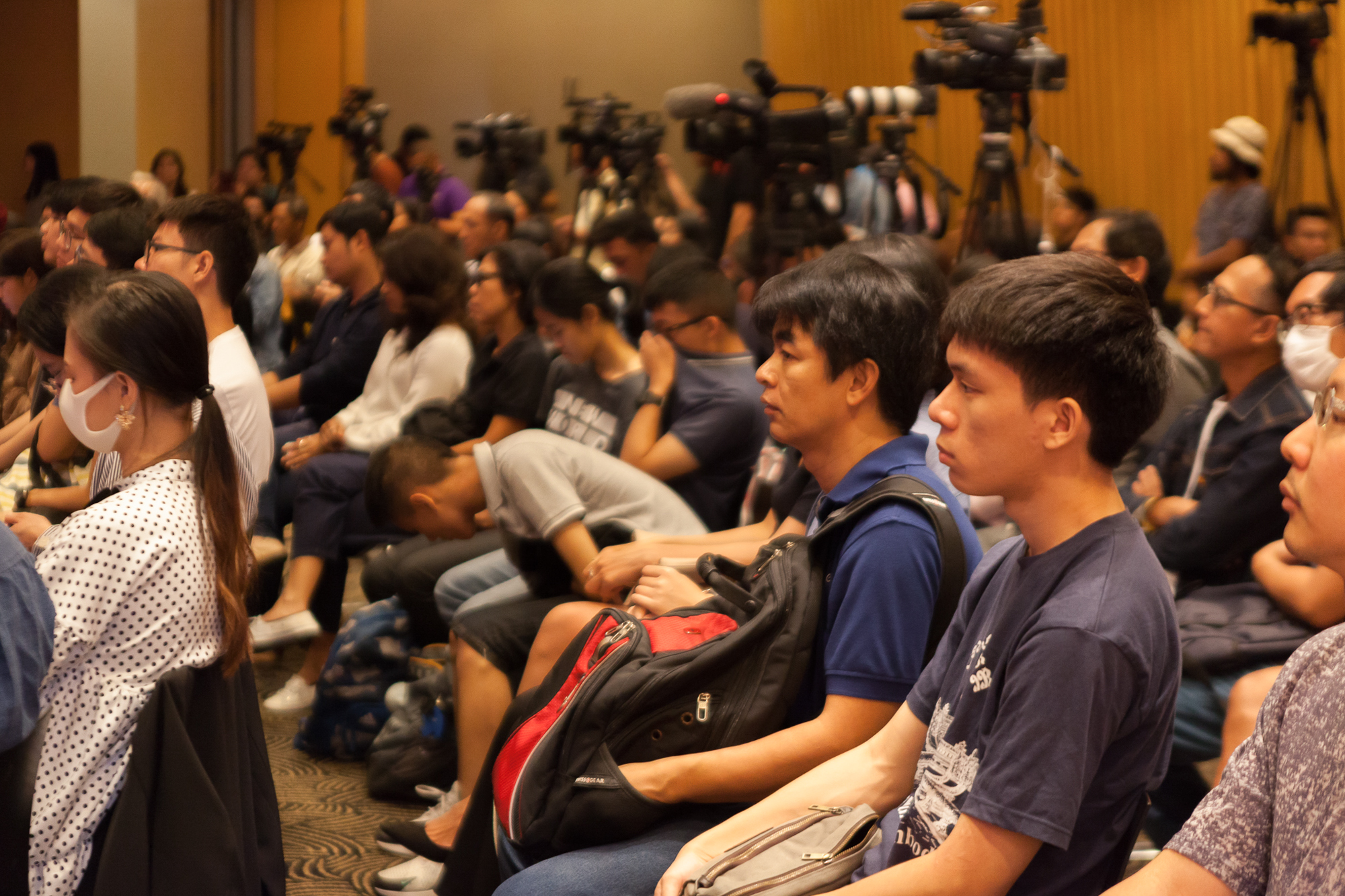
สุขทวี สุวรรณชัยรบ ผู้ร่วมก่อตั้งพรรคกลาง มองว่าการส่งเสริมศิลปวัฒนธรรมควรมีระบบนิเวศที่ส่งเสริมให้คนมีความเชื่อที่หลากหลาย และเลือกเอาข้อดีของการรวมศูนย์และกระจายอำนาจมาสร้างศักยภาพ มีการทำประชามติบ่อยๆ ผ่านเทคโนโลยีสื่อสารยุคใหม่ มีการกระจายเงินไปยังท้องถิ่นมากๆ ไม่ใช่ดูดเงินมาตรงกลางอย่างที่เป็นอยู่
พาลินี (พอลลีน) งามพริ้ง ผู้สมัครบัญชีนายกรัฐมนตรีพรรคมหาชน พูดถึงสามปัจจัยหลักคือ อำนาจนิยม วัตถุนิยม และชาตินิยม เป็นสามสิ่งที่ควรแก้ไข เพราะนำไปสู่การจำกัดสิทธิ การเหยียดเพศสภาพ และการแย่งอำนาจกัน ควรมีการพัฒนาการตลาดเชิงศิลปวัฒนธรรมเพื่อให้ศิลปวัฒนธรรมพัฒนาตามไปด้วย นโยบายพรรคยังให้ความสำคัญในการผ่อนปรนเงื่อนไขของกองเซ็นเซอร์ด้วย
องอาจ คล้ามไพบูลย์ ผู้สมัครบัญชีรายชื่อพรรคประชาธิปัตย์ กล่าวว่าปัญหาที่เกิดขึ้นกับหอศิลป์กรุงเทพนั้นสะท้อนสภาพศิลปวัฒนธรรมของไทยโดยภาพรวม นั่นคือ คนให้ความสนับสนุนน้อย ก่อนจะทำอะไรได้จึงต้องนำคนที่อยากเปลี่ยนแปลงเรื่องนี้เข้าไปมีสิทธิ์บริหารบ้านเมืองให้ได้เสียก่อน เพื่อให้รัฐทำหน้าที่สนับสนุนตรงจุดนี้ ไม่ใช่จำกัดเสรีภาพในการแสดงความคิดเห็นอย่างที่เป็นอยู่
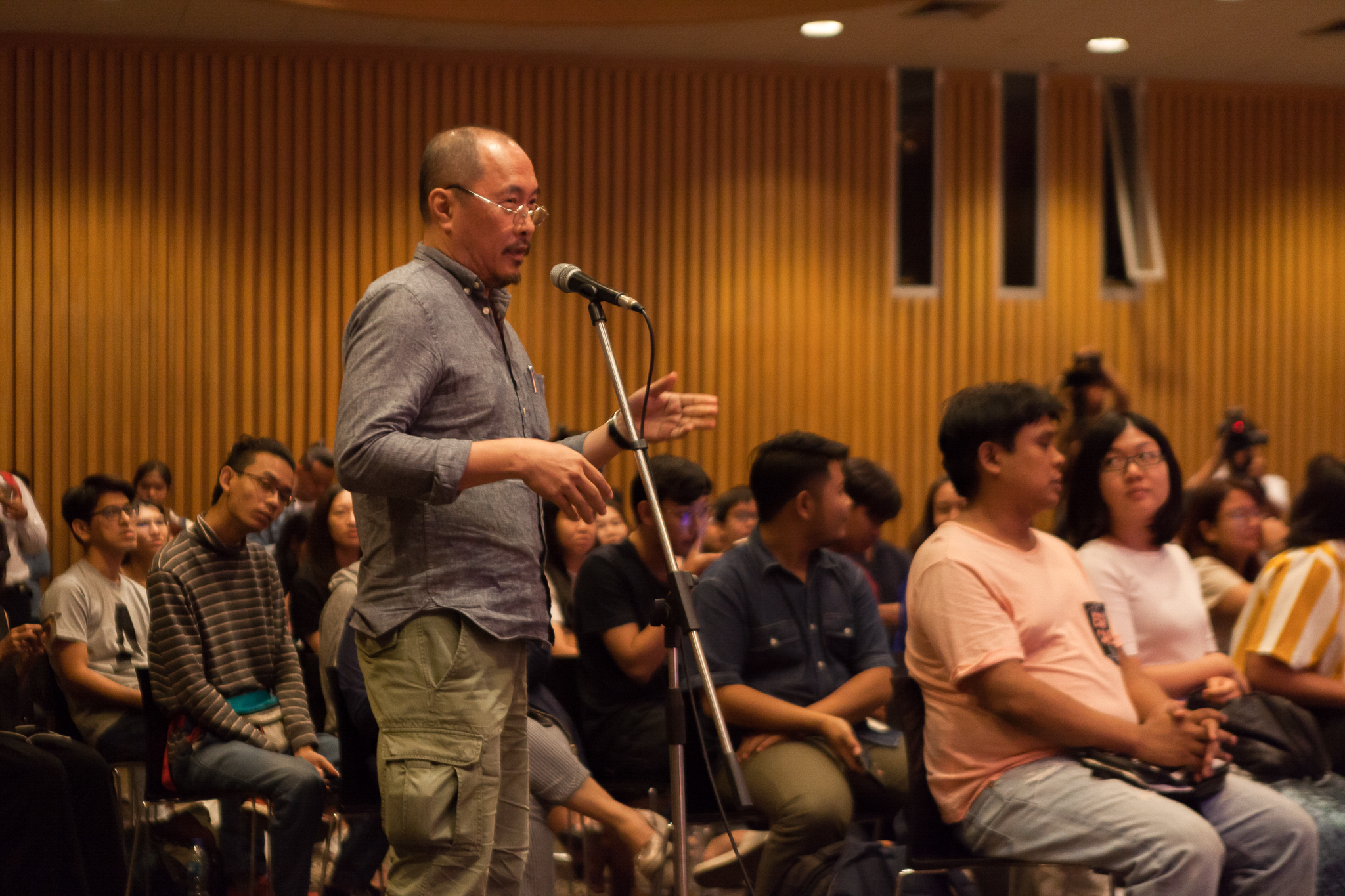
จบรอบแรกไปแบบฝืดๆ สักนิด เนื่องจากเป็นการพูดฝ่ายเดียวของนักการเมือง ช่วงหลังเปิดให้ผู้ชมได้ตั้งคำถาม คนต่อคิวยาวมาก หนักไปทางระบายความอัดอั้นส่วนตัวให้ตัวแทนพรรคที่อาจจะได้ไปบริหารบ้านเมืองได้รับรู้ มีเยาวชนร่วมตั้งคำถามหลายคนที่พูดเก่งมากจนน่าจะลงสมัครพรรคการเมืองได้ในอนาคต โดยเฉพาะน้องอายุ 16 ปีที่ฝากพวกพี่ๆ ไปเลือกตั้งเพื่ออนาคตของเขาที่ยังไม่มีสิทธิ์เลือกตั้งในครั้งนี้
ไฮไลท์ช่วงนี้เป็นคำถามสุดท้ายที่ถามทุกคนว่าชอบศิลปินท่านใดกันบ้าง สร้างสีสันและนำความบันเทิงมาอยู่บนเวทีทันใด จำคำตอบของทุกคนไม่ได้ แต่จำได้ว่าอาจารย์ปิยบุตรชอบปิกัสโซ่และคุณนิกรชอบวงควีน! ส่วนปัญหาเรื่องงบประมาณสนับสนุนหอศิลปที่เป็นสมบัติของกรุงเทพมหานครแต่ไม่ให้เงินม่บริหารนั้นยังคงเป็นปัญหาต่อไป

If the day came that ‘art and culture’ were to be the most prioritized issues in Thailand and amongst its citizen, the sight of prime minister candidates such as Sudarat Keyuraphan, Chadchart Sittipunt, Thanathorn Juangroongruangkit, Abhisit Vejjajiva and even Gen. Prayuth Chan-ocha engaging in a serious discussion about the present and future of art and culture wouldn’t be too farfetched to imagine. However, with the interest and focus of the society now on the economy and people’s well-being, the activity held by the Bangkok Art and Culture Center on the 17th of December that invited representatives from the 10 major parties rivaling for the upcoming election saw no participation from the aforementioned candidates.
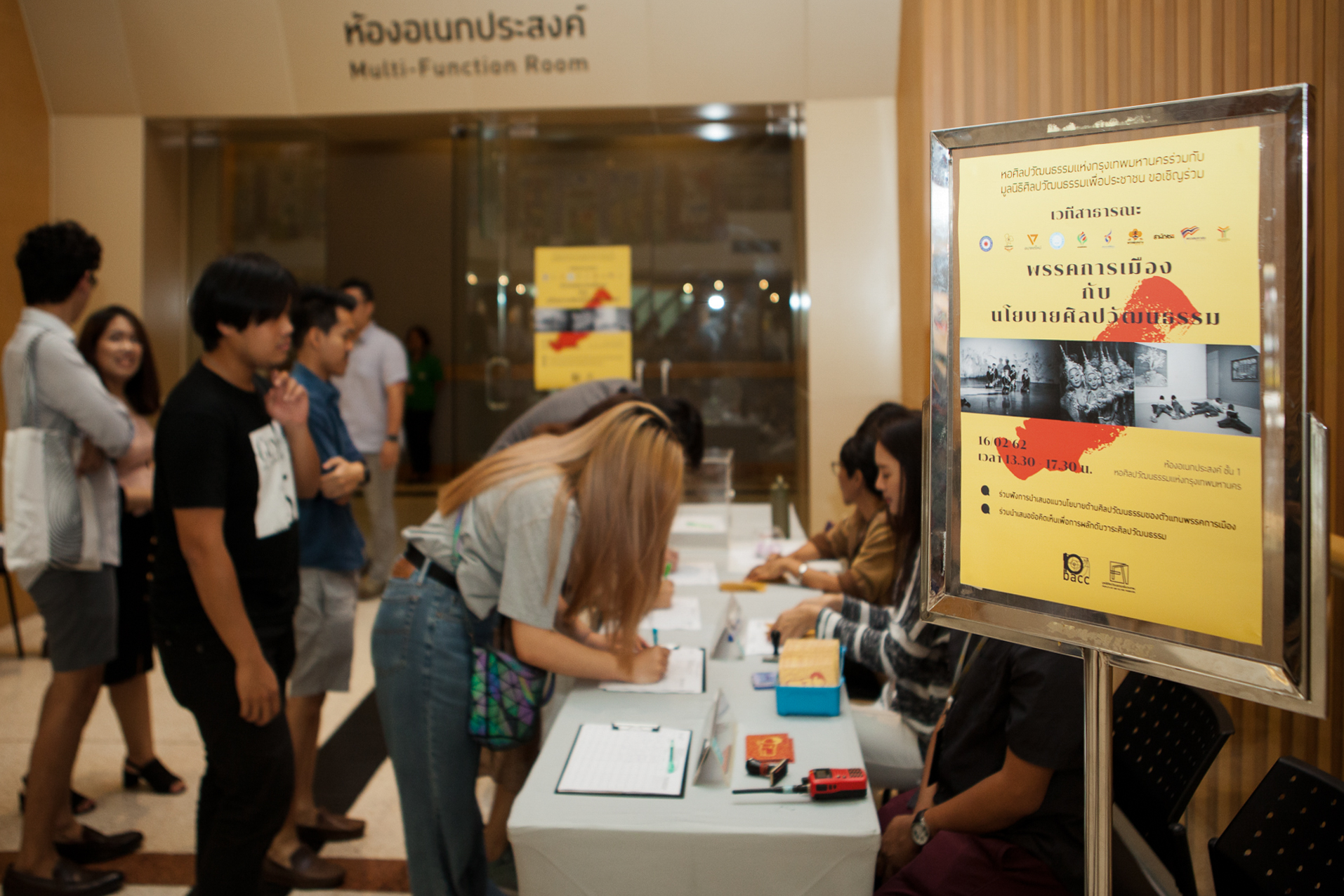
Pawit Mahasarinand, the director of the BACC, took the stage as the host and kicked off the debate with the presentation of updated information about the BACC and the ongoing debacle over Bangkok Metropolitan Administration’s refusal to continue funding the center’s operations. If the issue is not reconciled, the BACC will have to cease its operations this coming October. Such unsettling tendency is probably one of the reasons behind the organization of the event with hopes for the issue to be included as a part of the dialogue surrounding national politics, throwing stones to see how the local administration-run BACC will be treated.
Dr. Kongpob Wangsunntorn, the leader of the Phungluang Party, whose name was first heard at the debate (at least for me) spoke about how the policies of his party developed from his own Ph.D. thesis, believing that the development of art and culture are intertwined with the country’s economy. The party proposes the idea of establishing an art and cultural wisdom bank to further develop and improve the values of art and culture on a global scale.
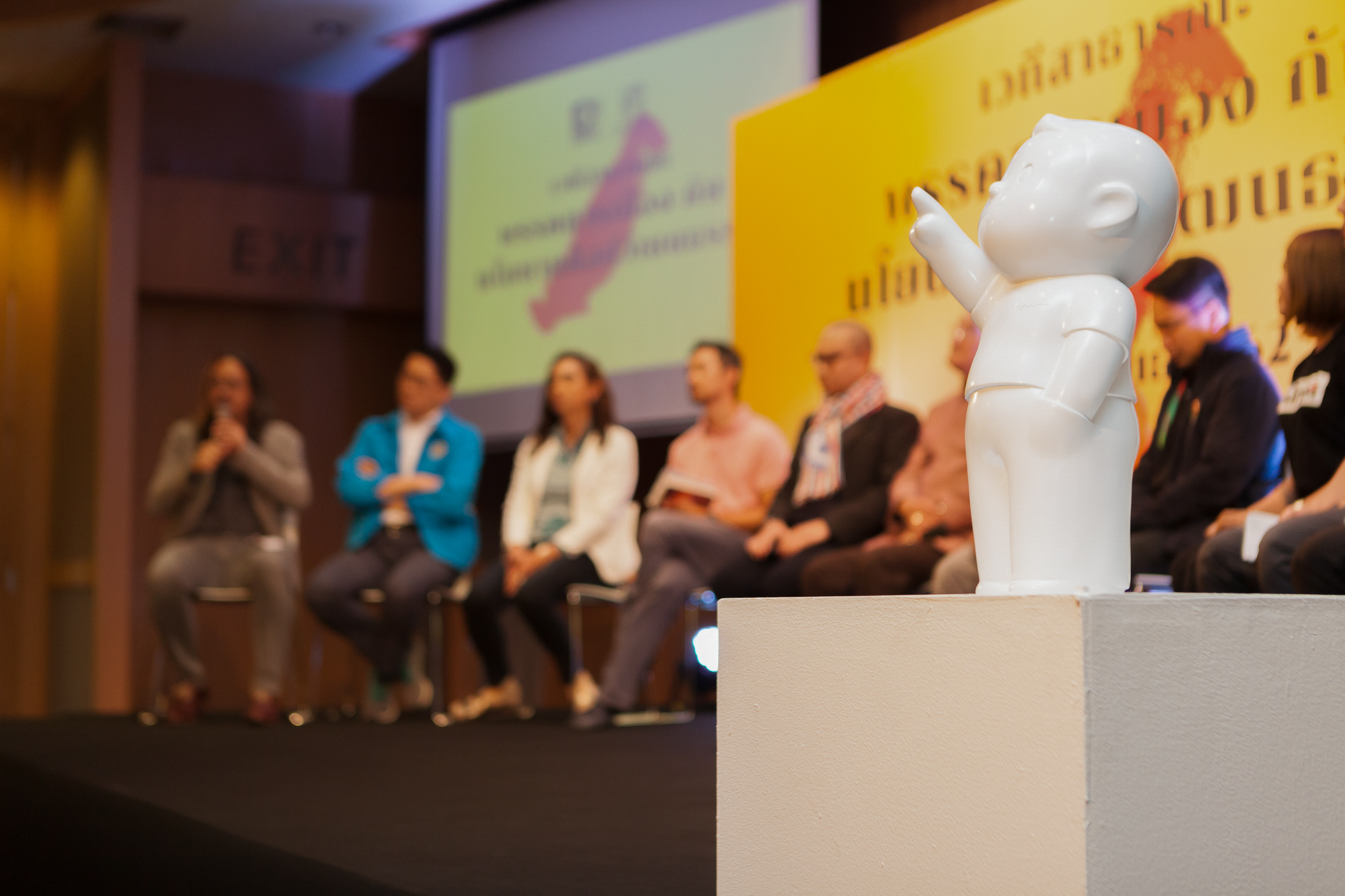
Piyabutr Saengkanokkul, Secretary of the Future Forward party, informed the crowd about the party’s key personnel with direct experiences and expertise in art and culture. He continued by saying that the party’s policies are designed following the problems of the contradicting nature between Thailand and the global cultural climate. The traditionally defined and unchangeable definition of ‘Thainess’ presents a significant contrast to the fluidity and constantly changing meanings of universality. With the belief that art and culture are the tools that can reshape a people’s mindset, the party is driven by the idea of distributing cultural power to localities through community art spaces in all 76 provinces of Thailand, including the founding of the National Council of Art and Culture. Saengkanokkul then closed his speech with the party’s Thailand Equality motto promoting equality in Thai society and the country’s ability to catch up with the changing world.
Laksanaree Duangtadam, a member of the working committee of the Commoners’ Party opened the speech with the problems that prevent an organic growth of art as a result of Thailand’s comparatively low cultural ceiling caused by suppression from laws and an unsupportive education system that obstructs a healthy development of cultural climate and diversity. The party aims to revise the laws that stop people from securing freedom of expression as well as their ability to tell their stories freely.
Chuenchob Kongudom, a party list candidate of the Thai Local Power Party believes that the country’s development cannot be measured by the figures of people’s incomes. He later proposed the opening of 24-hour learning centers to increase cultural value by engaging participation from locals with the phenomenal success of Japan’s Kumamon bear being the model.
Nikorn Chamnong, the Director of the Chartthaipattana Party, shared his experiences as the former minister, calling himself a guitar player and someone who is on the same side as the artists. The party’s policy on art and culture is based on the glorification of Thai characteristics and cultural diversity.
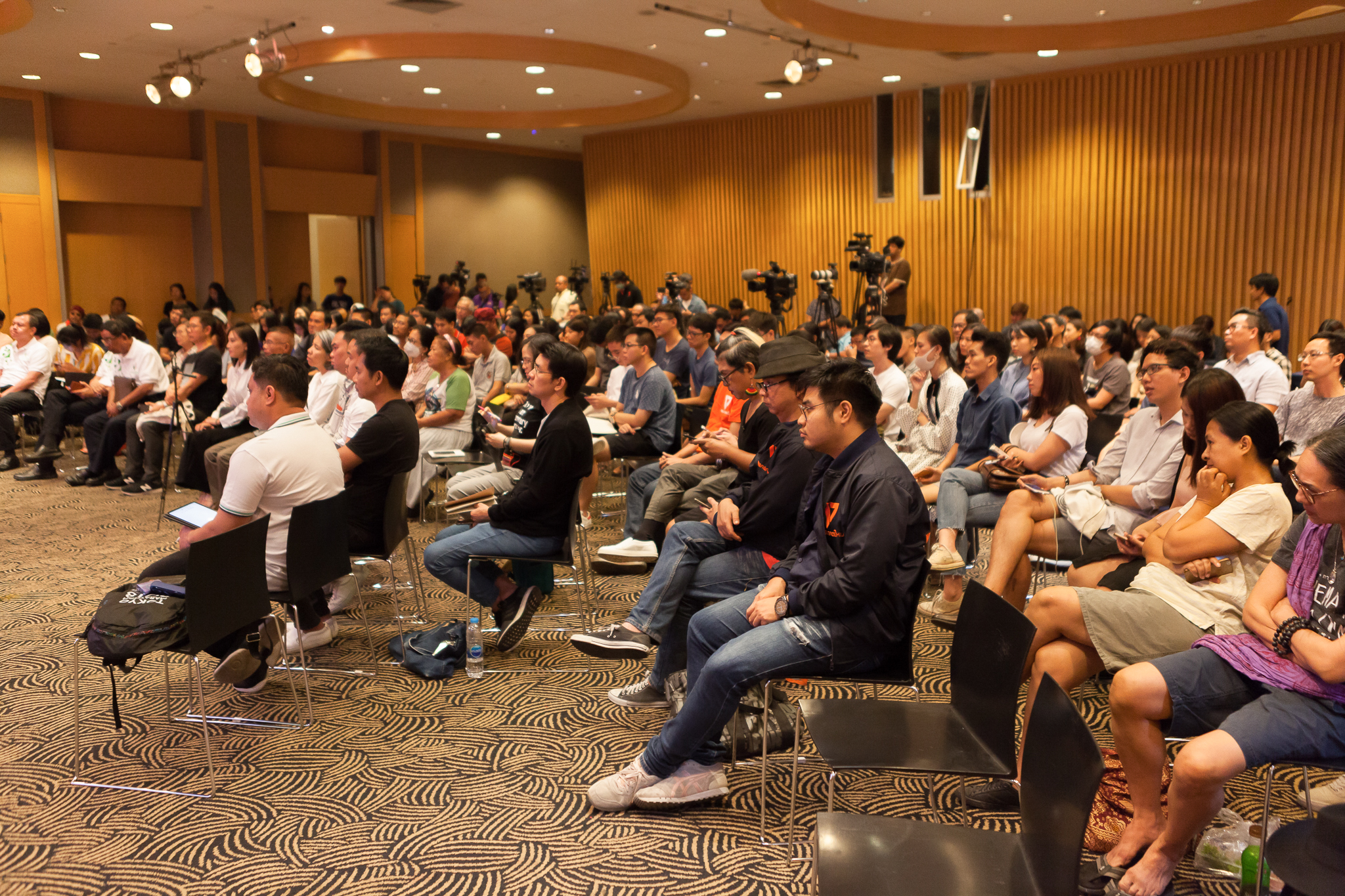
Captain Dr. Jomdet Trimek of the Action Coalition for Thailand Party supports contemporary Thailand through the idea of exporting Thai culture to the global market. He remarks that the conceptualization of Thai identity should not be produced and distributed from the center and that the emphasis should be put on the diversity of local identifies. The party also aims to turn Silpakorn University into a hub and the heart of the artistic community.
Sukthawee Suwannachairop, the co-founder of the Glang Party, sees that the promotion of art and culture needs its own supporting ecosystem while the upsides of centralization and decentralization should be used to strengthen their potential. He also encourages the use of a Referendum regularly through modern communication technologies and the equal distribution of the budget to localities rather than centralizing the budget as it is today.
Pauline Ngarmpring, another prime minister candidate from the Mahachon Party speaks about the rise of authoritarianism, materialism and nationalism, and their association with the limitation of human rights, sexual discrimination and the fight for power, which needs to be deadened. He also speaks about the development of art and culture as a market, which will allow for art and culture to evolve. The policies also extend to the mitigation of censorship regulations.
Ongart Klampaiboon, a party list candidate from the Democrat Party views the problem that BACC is facing as a reflection of the overall circumstances of Thailand’s art and culture, which is essentially a lack of support from the public sector. To change this situation, electing people who are willing to make a change to be in a position where they are given the right to run the country the way it’s supposed to be run and allow for the state to provide direct support instead of trying desperately to limit people’s freedom of expression, was suggested.
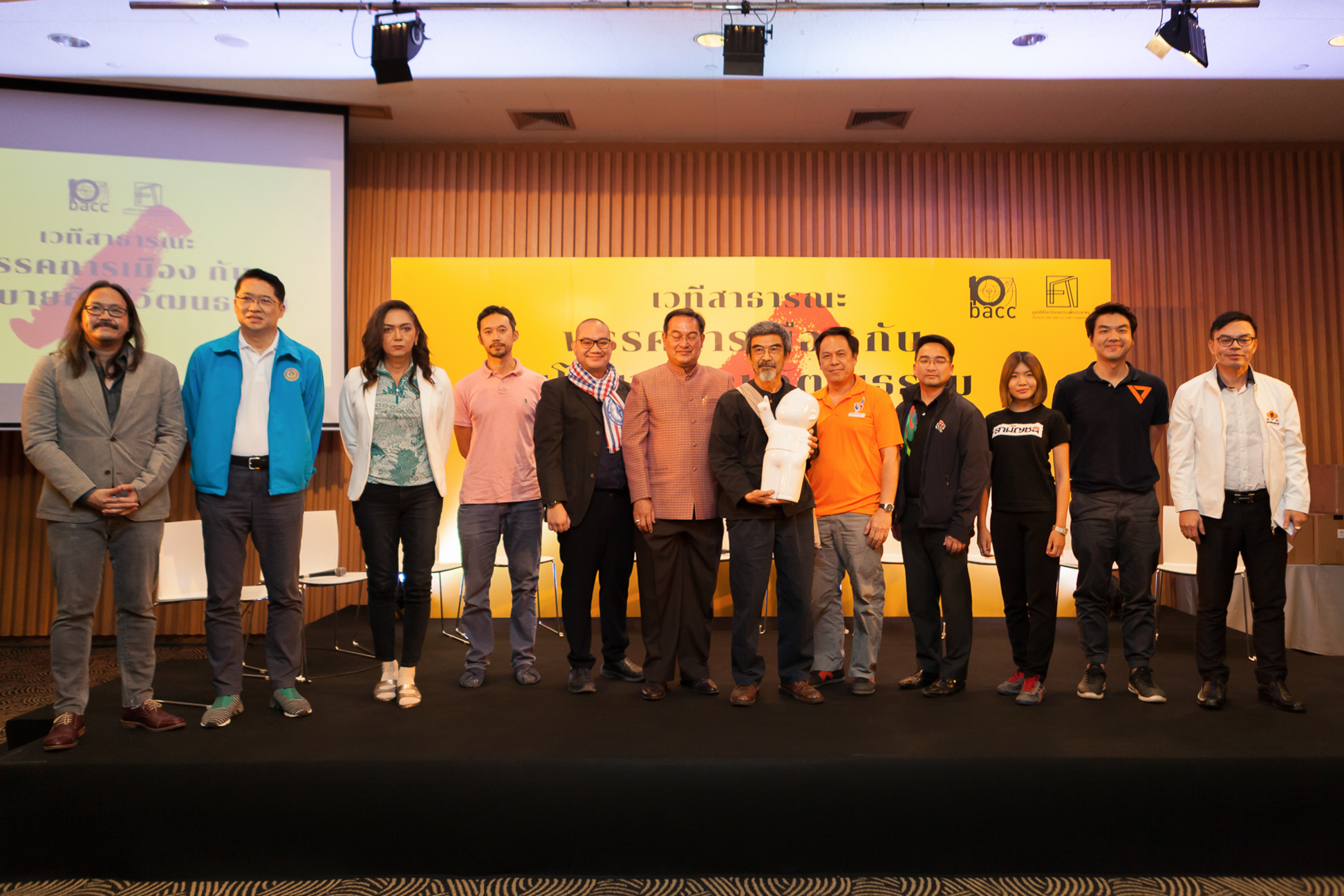
The first session was pretty dry since it was more of a one-sided conversation where all the politicians did all the talking. But the Q&A was another story with people eagerly waiting to ask questions, intensely and passionately expressing what has been on their minds after five years of suppression. The messages were sent directly to the representatives who might have a chance of running the country. There were many youngsters in the audience with speaking skills so impressive that we want to see them run for office someday, especially the 16-year-old who still doesn’t have the right to vote but encouraged the crowd to vote for the right thing and the right people for the sake of his future.
The highlight of the Q&A was the last question directed to all the speakers asking about their favorite artists, which closed up the rather serious event quite entertainingly and lightheartedly. While I don’t exactly remember all the answers, I do remember that Saengkanokkul’s favorite artist is Picasso while Chamnong’s favorite band is Queen! As for the issue over the Bangkok Metropolitan Administration’s refusal to fund BACC despite the center being an organization operated directly under its administration, the solution remains a mystery.

